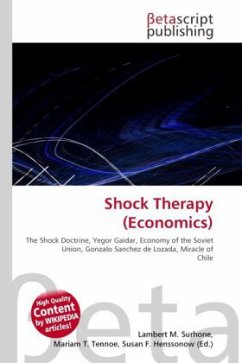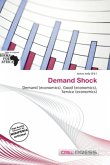High Quality Content by WIKIPEDIA articles! High Quality Content by WIKIPEDIA articles! High Quality Content by WIKIPEDIA articles! In economics, shock therapy refers to the sudden release of price and currency controls, withdrawal of state subsidies, and immediate trade liberalization within a country, usually also including large scale privatization of previously public owned assets. The term arose after Bolivia successfully tackled hyperinflation in 1985 under Gonzalo Sanchez de Lozada, and was heavily influenced by prominent economist Jeffrey Sachs. Sachs became shock therapy's foremost proponent after studying historic periods of monetary and economic crisis and noting that a decisive stroke could end monetary chaos, often in a day. In particular Sachs and Sanchez de Lozada cited West Germany where, during a period over 1947-48, price controls and government support were withdrawn over a very short period, kick starting the German economy and completing its transition from an authoritarian post-War state.







